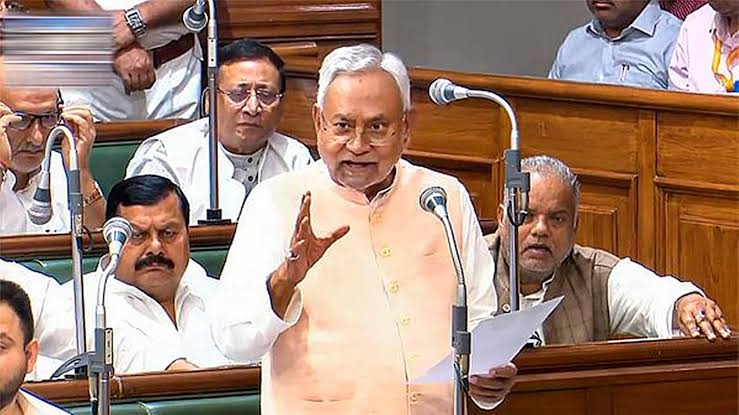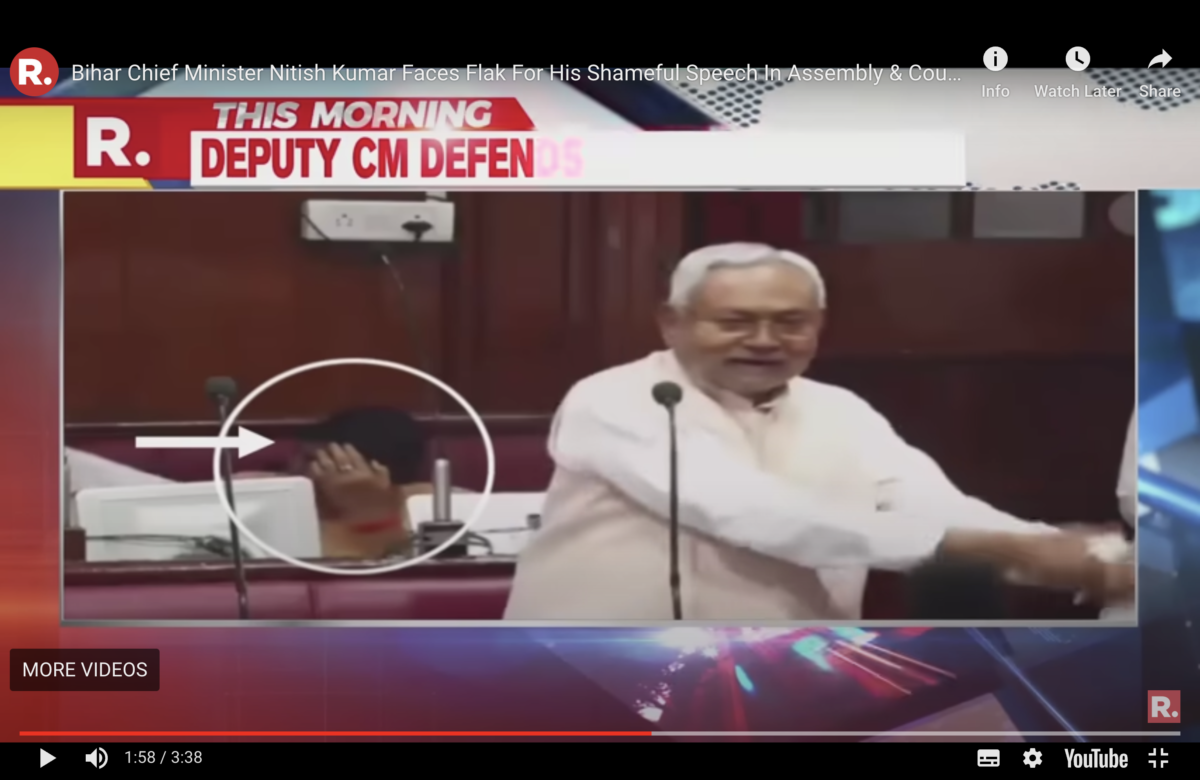Table of Contents
“If it was wrong to make that remark, then I apologise for this. If what I said is being condemned, I take it back and condemn myself”, Nitish Kumar apologised by making this statement to everyone in front of the reporters and media.
Widespread outrage resulted from Bihar Chief Minister Nitish Kumar’s remarks connecting women’s education to population control. The Bihar Assembly postponed after Kumar’s candid portrayal of educated women’s participation in contraception during a legislative session drew criticism from Prime Minister Modi and demands for his resignation from BJP leaders. The event made people uncomfortable, and people’s reactions varied. Tejashwi Yadav, the head of the opposition, attempted to recast the discussion as sex education. In his calm reply, Kumar emphasised the importance of Bihar’s fertility rates and literacy rates.

On Wednesday, November 8, the leader of the Janata Dal (United) Nitish Kumar, who is known for the longest serving chief minister of Bihar, apologised for the remark he made during his State Assembly speech highlighting the topic of women’s education and population control on Tuesday. His statement had triggered a large population of citizens all over India as well as left Bihar in concern. Speaking to reporters today, he made it clear on his behalf that he had no intention of disrespecting and humiliating women. He apologised publically while talking to the reporters and took his words back.
Addressing on Tuesday during the caste census report’s introduction in the Bihar legislative assembly, Nitish Kumar implied that a well-educated woman could assist in managing population growth by preventing every sexual encounter from becoming a pregnancy. Bihar Chief Minister Nitish Kumar presented a vivid depiction during the assembly session of how a married lady who is “educated” could persuade her husband to use a specific technique of contraception or birth control.
Nitish Kumar’s obscene remarks that caused fury:
ANI tweeted the video of Nitish Kumar’s statement. He said, “When a girl and a boy marry, the man will do it with her on their wedding night as it is a practice that has continued for years. Due to this, birth happens. However, if the girl is educated, she understands that while he will engage in intercourse, he should not complete the act by ejaculating inside her; instead, he should pull out”. These were the exact words spoken by Nitish Kumar on the floor of the State Assembly.
He repeated the identical remarks in the Vidhan Parishad, thus it is clear that this is not an isolated incident. “When a girl is educated, you know? When a boy and a girl get married, the boy will have sex with the girl every night. So if he will have sex with her, he will ejaculate inside her. At the same time, the girl says OK do it at night, but when you are about to release then pull out and throw.”
How has this affected citizens and politicians?
A recent update is Bihar Chief Minister Nitish Kumar was criticised by Prime Minister Narendra Modi for using language he believed to be inappropriate while discussing women. The agitation, which included BJP leaders calling for the resignation of the Janata Dal leader, caused the Bihar Assembly to adjourn until 2:00 p.m. on Wednesday. In reaction to the outrage raised by his remarks linking population control with women’s education, Kumar apologised on Wednesday.
A woman minister seated behind him concealed her face for a brief moment, being visibly uncomfortable as a result of his thorough explanation, and the opposition BJP party strongly condemned his statements, calling them “vulgar,” “derogatory,” and “double-meaning.” The opposition party reacted immediately to Nitish Kumar’s graphic portrayal of the method’s implementation in reality, which highlighted the divisive character of the statements made and caused discomfort among those in attendance. This incident spurred a contentious discussion or heated debate and brought attention to the CM’s illustrative approach to seeking inappropriateness in a parliamentary context.

The Speaker of the Bihar Assembly, Awadh Bihari Choudhary, has been requested by the National Commission for Women (NCW) to take firm action against Chief Minister Nitish Kumar for his remarks made during the Assembly on the relationship between population control and women’s education. The NCW expressed serious dissatisfaction and asked Kumar to apologise. The panel strongly denounced in a written letter to the Speaker the serious disrespect shown to women by those in positions of power who used disparaging and sexist language. The NCW’s letter emphasises how crucial it is to hold politicians responsible for their words and deeds, especially when they touch on delicate subjects like women’s rights and education.
Was Nitish Kumar Unflazed?
As emotions stirred in the assembly, with some expressing anger, dissatisfaction, and a few even smiling, Education Minister Chandra Shekhar who was seated nearby, stayed remarkably calm and unbothered. Nitish Kumar seemed unfazed by the differing responses and carried on with his speech. He highlighted the notable fall in Bihar’s fertility rates, which went from 4.3% to 2.9%. The Chief Minister linked this change to the state’s overall rise in literacy at the same time.
The Chief Minister’s cool-headedness in the face of a wide range of emotions highlighted the importance of the falling fertility rates and the connection between increased literacy and the changing demographics in Bihar.
Kumar’s remarks triggered and condemned a number of citizens and politicians to which Tejashwi Yadav tried to calm down and justified painting Nitish’s remark as “sex education” instead. Yadav gave a statement to the reporters, saying, “Whenever it is talked about sex education, people get shy and hesitate to discuss this. People shouldn’t stay away from these. Nowadays, studies about this take place in schools… He actually wanted to convey his opinion on population control. It shouldn’t be wrongly interpreted by people. It should be more taken as a sex education.”
Conclusion:
Chief Minister Nitish Kumar of Bihar received widespread condemnation for comments he made recently at an assembly session regarding the connection between population control and women’s education, which caused a great deal of public anger and controversy. The National Commission for Women (NCW) strongly objected to his remarks, and the Speaker of the Bihar Assembly Awadh Bihari Choudhary then demanded strict punishment. The NCW harshly denounced Kumar’s use of what they called filthy and insulting language, especially coming from someone in such a powerful and responsible position.
In a formal letter to the Speaker, the NCW emphasised the critical need for leadership duty of care, particularly when talking about women’s rights and education. The commission emphasised that the Chief Minister must issue a public apology, highlighting the profound disrespect that such language shows for women.
Along with sparking a heated debate, the controversy also brought up more general issues around proper language usage, particularly in political and public settings. Kumar’s comments sparked a national dialogue on the duty of leaders to advance gender parity and tact when tackling important problems like women’s education and population control, calling for a more courteous and thoughtful language in government.
_________________________________________________________________________________



